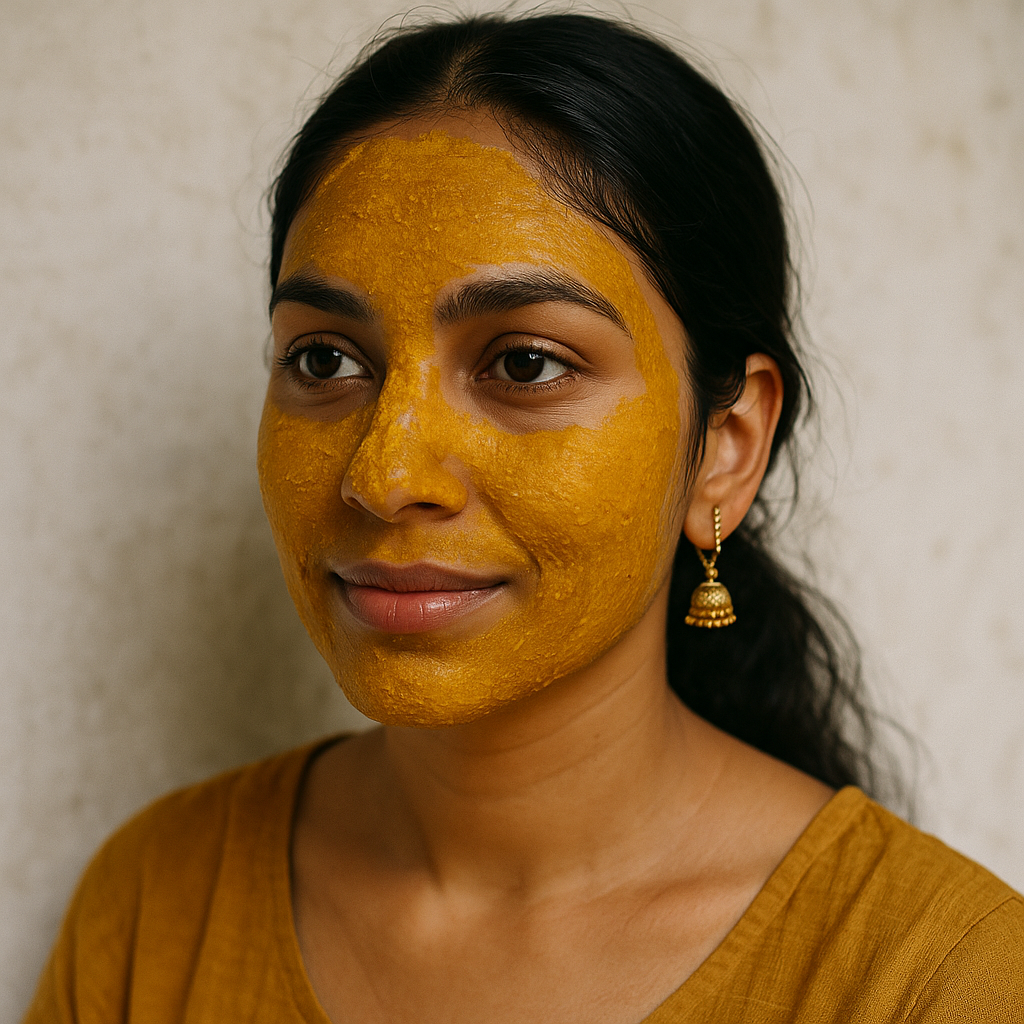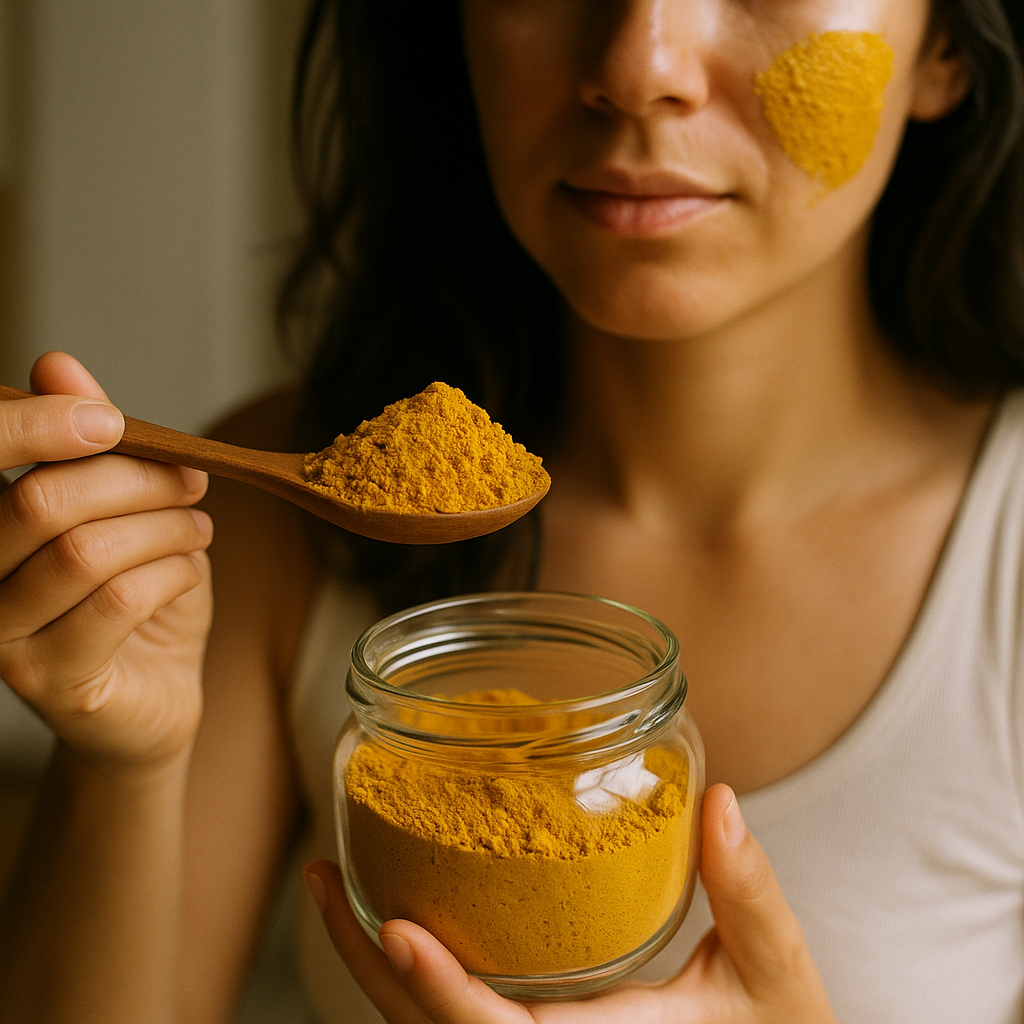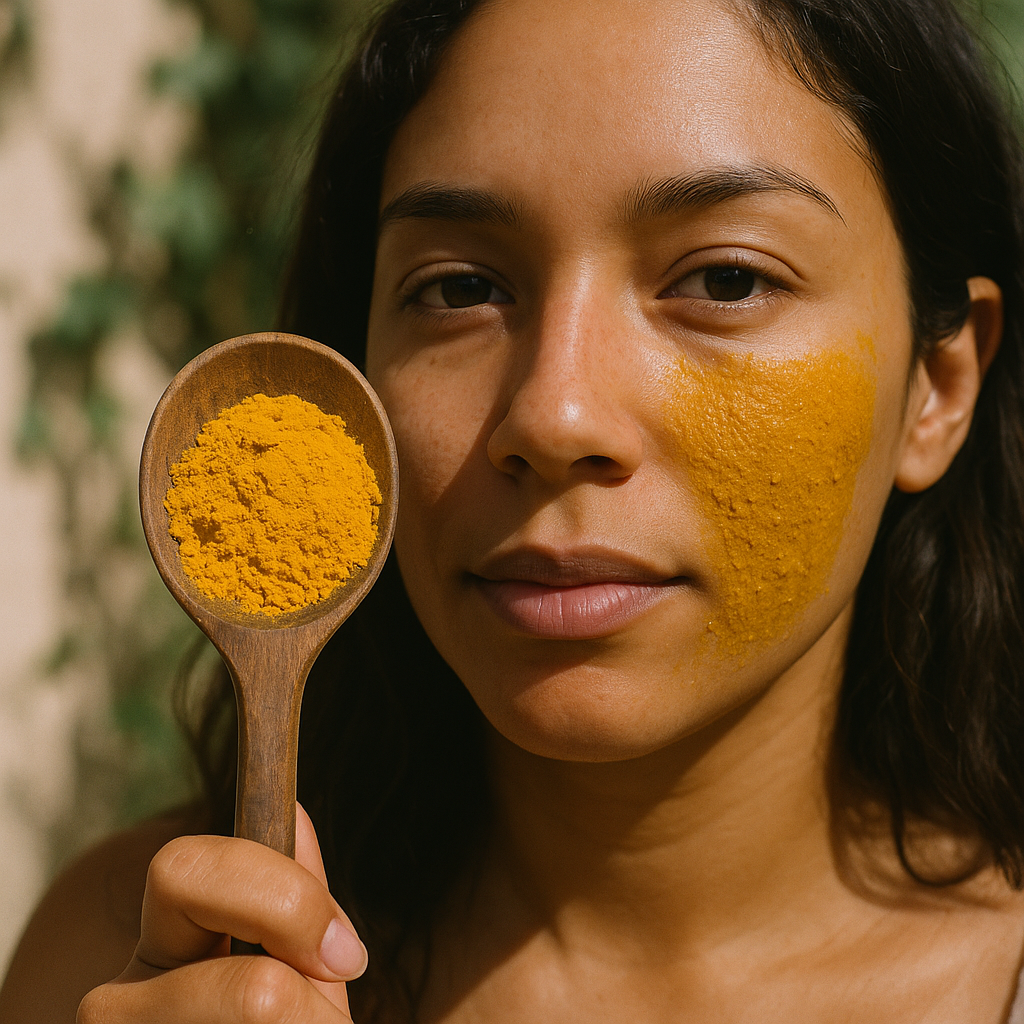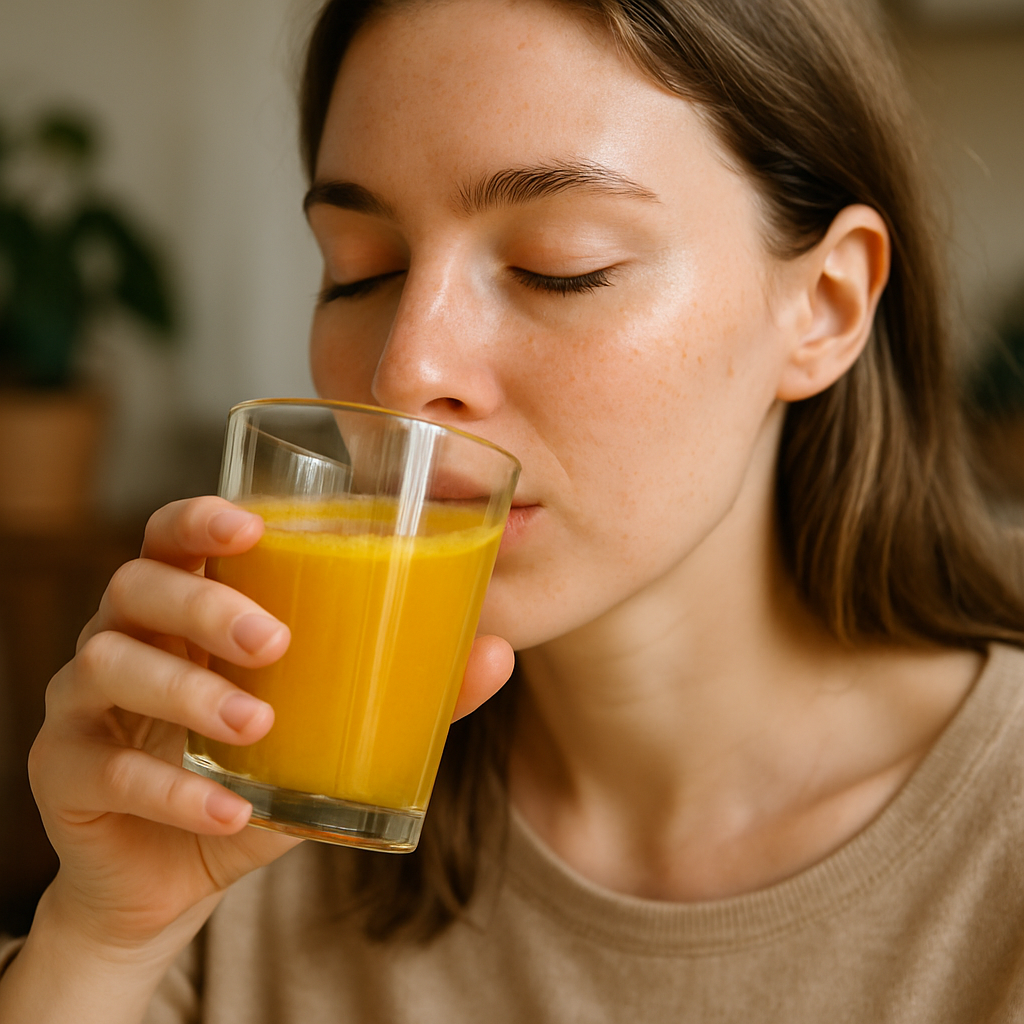Ask Ayurvedic doctor a question and get a consultation online on the problem of your concern in a free or paid mode. More than 2,000 experienced doctors work and wait for your questions on our site and help users to solve their health problems every day.
Is Turmeric Good for Face? Ayurvedic Benefits, Uses, and Precautions

If you’ve ever caught yourself scrolling through DIY beauty tips or skincare reels, chances are you've seen someone with a bright yellow turmeric mask smeared all over their face. It's not just a trend — turmeric’s been used for centuries in Ayurvedic skincare. So let’s get straight to the burning question: is turmeric good for face? Short answer? Yes, but it depends on how you use it and which kind you're using.
From the glow-boosting haldi ceremonies in Indian weddings to modern-day serums and scrubs, turmeric has seriously stood the test of time. People are now curious about not just how to use turmeric on face but also whether turmeric powder is good for face or if raw turmeric does better. Not to mention, drinking turmeric is becoming a hot skin-care trend too. And yep, there’s even turmeric oil benefits for skin you might not’ve heard of yet.
In this article, we're gonna break it all down — from benefits and types of turmeric, to usage tips and common mistakes you’ll want to avoid.

Why Turmeric Is a Popular Ayurvedic Remedy for Skin
Ayurvedic View on Turmeric for Skin Health
In Ayurveda (one of the world's oldest healing systems), turmeric — or Haridra as it’s traditionally called — is a sacred herb. It’s praised for its ability to purify blood, balance doshas (especially Pitta), and detoxify the skin from the inside out. It’s not just about putting it on your face — even drinking turmeric benefits for skin, too. Think golden milk, turmeric teas, or even just turmeric water.
Ayurvedic texts often recommend turmeric for treating skin diseases, inflammation, and hyperpigmentation. But that doesn’t mean slapping on cooking turmeric is always the best idea (we’ll get to that part later). Used right though, it can be a game changer.
Key Properties of Turmeric: Anti-inflammatory, Antibacterial, Glow-Enhancing
Turmeric contains curcumin — a powerful compound known for its anti-inflammatory and antioxidant qualities. This lil’ compound helps fight free radicals, reduces redness, and heals skin faster. It's also got antibacterial traits, which makes it super helpful for acne-prone skin.
One reason turmeric powder is good for face is because it targets the root of many skin issues: inflammation. Whether it’s redness, a pimple, or itchy dry patches — turmeric can calm that chaos. And then there's the glow part. Seriously, regular use of turmeric can give skin a subtle, natural radiance. But you gotta be patient — it’s not a one-night miracle.

Don't wait or self medicate. Start chat with Doctor NOW
Benefits of Using Turmeric on Face and Skin
Turmeric for Acne, Scars, Pigmentation, and Uneven Tone
One of turmeric’s best-known superpowers is acne-fighting. It doesn’t just kill acne-causing bacteria, it also helps soothe the skin after breakouts. Less swelling, less scarring.
When used regularly, turmeric masks or scrubs may reduce dark spots and pigmentation. So, if you're wondering how to use turmeric on face to even out skin tone — the answer lies in consistency. Twice a week is a good start (but maybe not every day — more on that later!).
It can also help fade scars and calm inflamed skin. And let’s be real, who doesn’t want that smooth, baby-cheek glow?
Turmeric Oil Benefits for Skin Health
Turmeric oil is kinda underrated, tbh. It’s like turmeric’s cooler cousin — packed with concentrated curcumin and perfect for topical use. When applied properly, turmeric oil benefits for skin include improved texture, smaller-looking pores, and that healthy dewy look without being greasy.
Plus, it absorbs faster than raw turmeric or powder masks. Just mix a drop or two with a carrier oil (like jojoba or almond oil), and you’re good to go.
Drinking Turmeric: Benefits of Turmeric Water and Golden Milk for Skin
It ain’t just about what you slap on your face — what goes in your body matters, too. Drinking turmeric benefits for skin by boosting liver function, aiding digestion, and lowering inflammation throughout the body.
Turmeric water (basically a pinch of turmeric in warm water with lemon) is a go-to Ayurvedic detox drink. And golden milk? That’s turmeric + milk + black pepper + a little honey = skincare magic in a mug.

How to Use Turmeric on Face Safely and Effectively
Alright, so now that you're (hopefully) convinced that turmeric is more than just a kitchen spice, let’s talk about the right way to use it on your face — without turning your skin bright yellow or accidentally causing irritation. Because yep, both can happen.
How to Use Raw Turmeric on Face
If you're going full-on natural, raw turmeric is like the OG skincare flex. You can grate a small piece of raw turmeric (just a little — this stuff is strong!) and mix it with ingredients like yogurt, honey, or aloe vera gel to make a paste. Apply it evenly, leave it on for about 10–15 minutes, and rinse off with lukewarm water.
Just don’t overdo it. Raw turmeric stains... like, a lot. And if you’ve got sensitive skin, patch test first. That can’t be overstated.
Oh and side note — raw turmeric also has a stronger scent. Earthy, spicy, kinda funky? Some people love it. Some don’t. That’s totally normal.
How to Use Turmeric Powder on Face
Turmeric powder is the more convenient option for most folks. But is turmeric powder good for face? Yes — if you pick the right one. Not all turmeric powders are created equal. Go for organic, chemical-free powders made specifically for cosmetic or Ayurvedic use.
Here’s a classic DIY turmeric face mask that’s pretty much fool-proof:
-
1 tsp turmeric powder
-
2 tbsp gram flour (or oatmeal)
-
2–3 tbsp milk or rose water
Mix it all into a thick paste, apply, leave it on for 15–20 minutes, and wash off. It’s great for light exfoliation, clearing up dullness, and adding a soft glow.
But if you're wondering how to use turmeric powder on face without staining — tip: add a little yogurt or lemon juice, and always rinse off thoroughly. Like, don’t rush it.

How to Choose the Right Type of Turmeric for Your Skin
Okay, now comes a tricky bit. You’re standing in a store (or scrolling online), and you see all kinds of turmeric — cooking turmeric, wild turmeric, roasted turmeric... uh, which one’s good for your face?
Which Turmeric Is Good for Face: Kasturi vs Cooking Turmeric
Kasturi turmeric, also known as wild turmeric, is your best bet for skincare. Why? It has all the benefits of regular turmeric but doesn’t stain as much. Plus, it’s usually gentler on skin and not used for cooking.
Cooking turmeric is good for face only if it's pure, organic, and free of additives. But it stains way more, so be prepared. Also, avoid turmeric blends or spice mixes — those are full of salt or other stuff that has no business being on your skin.
So, is roasted turmeric good for face? Honestly, not really. Roasting reduces curcumin levels and kind of takes away from what makes turmeric magical in the first place.
Tips to Avoid Yellow Stains and Ensure Gentle Application
No one wants to look like a banana after their skincare routine, right? Here's what helps:
-
Mix turmeric with thick bases like honey, yogurt, or milk.
-
Don’t leave it on too long — 15–20 mins max.
-
Use an old towel (because yellow stains will happen).
-
Rinse with warm water and follow up with a gentle toner or micellar water.
And seriously, patch test everything. Even if you're using “all-natural” stuff, your skin might still react.
Conclusion
So... is turmeric good for face? Absolutely — but only when you know what you're doing. It’s not some miracle overnight fix, but with a little care and consistency, turmeric can seriously up your skincare game.
Whether you’re dabbing on raw turmeric, sipping turmeric water for that inside-out glow, or trying out a face oil with turmeric extract, the key is balance. Understand your skin, choose the right type of turmeric (seriously, please don’t grab that grocery-store spice jar without reading the label), and start slow. You don’t need to look like a curry to get the benefits!
Also, not every DIY face mask is your friend. If you’ve got sensitive or reactive skin, it’s okay to take it easy or skip altogether. There’s no one-size-fits-all when it comes to skin, and turmeric is powerful enough that a little goes a long way.
And hey — turmeric powder is good for face, sure. But so is drinking it, eating it, even just smelling it if you're into that. Don’t sleep on the internal benefits of turmeric either; that golden milk trend isn’t just an Instagram thing. Drinking turmeric benefits for skin, digestion, immunity, and more.
One last thing? Be patient. Like, really patient. Results show up with time, and your skin will thank you later for not going overboard early on. So go ahead — try that turmeric glow-up. Just maybe skip the white towels.
FAQs
Which turmeric is best for face masks and sensitive skin?
Kasturi turmeric (also called wild turmeric) is considered best for facial use, especially if you’ve got sensitive skin. It’s non-edible, less likely to stain, and generally gentler on the skin compared to regular cooking turmeric. If you're using turmeric powder, make sure it's labeled for cosmetic use and doesn’t have artificial colorings or additives.
Can I use turmeric powder on my face daily?
Not really recommended, to be honest. Even though turmeric powder is good for face, using it every day might cause dryness or irritation for some people — especially if you’re using lemon juice or other acidic ingredients in your mask. 2–3 times a week is ideal for most skin types. More than that? Eh, you’re pushing it.
Is drinking turmeric water effective for skin glow?
Yep, pretty effective — as long as you’re consistent and realistic. Drinking turmeric water (with warm water, a dash of black pepper, and maybe a lil’ honey) can help flush out toxins, reduce inflammation, and support overall skin clarity. Combine it with a good skincare routine and healthy eating, and you'll likely see results over time. Just don't expect your pimples to vanish after one cup.
Turmeric’s having a major skincare moment — but it’s also been a time-tested part of Ayurveda for thousands of years. The key is using it wisely, knowing what your skin needs, and choosing the right kind (seriously, ditch the curry mix).
If you found this guide helpful, share it with a friend who needs some turmeric magic in their life! Or bookmark it for your next self-care Sunday. ✨

